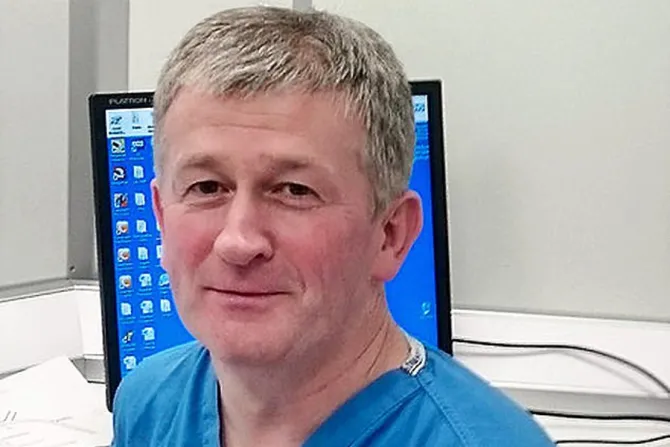Doctor Dermot Kearney. | Christian Concern.
A Catholic doctor will again be allowed to offer a treatment known as “abortion pill reversal,” after a British medical licensing body concluded that the treatment was not dangerous, and dismissed all charges brought against him on March 7.
Dr. Dermot Kearney had been blocked since May 2021 from offering the treatment after a complaint was brought by an abortion provider active in the UK.
The treatment in question is designed to “reverse” the effects of the first of the two drugs that make up the regimen commonly called the “abortion pill.”
The treatment involves large doses of progesterone— administered either orally or intravenously— for women who have taken mifepristone.
Progesterone is the hormone that sustains pregnancy, and mifepristone is designed to block it, effectively starving the baby. The second pill in the abortion pill regimen, misoprostol, induces labour.
The General Medical Council (GMC), which licenses and regulates UK doctors, had been investigating the safety of the abortion pill reversal (APR) treatment following a complaint from Jonathan Lord, director of MSI Reproductive Choices, an abortion provider. Lord had objected that progesterone is not licensed for this use and that there is “no evidence this treatment works and there is some evidence it may even be harmful.”
Kearney, a cardiologist and former President of the Catholic Medical Association (UK), had since June 2020 been calling in prescriptions for the treatment for UK women who requested it through Heartbeat International, a longstanding network of pro-life pregnancy assistance.
The GMC’s investigation, conducted by an impartial expert, found that APR treatment does not increase the risk of harm to an unborn baby and that although some women who receive APR treatment reported bleeding, that was likely due to the effects of the abortion drug, and not the APR treatment itself.
Anecdotal reports of the treatment’s success are widespread, but abortion pill reversal has not been widely studied in clinical settings. For empirical evidence of its effectiveness, supporters often point to a 2018 study in the journal Issues in Law and Medicine.
In observations of 754 patients who sought abortion pill reversal before taking the second drug, the researchers said that intramuscular progesterone had a reversal rate of 64% and high dose oral progesterone had a reversal rate of 68%, when administered within 72 hours of taking the first pill. The baby could be expected to survive in only about 25% of cases after a mother takes mifepristone, the study says.
On March 30, 2020, the UK government announced that women would be allowed to receive abortion pills via mail and perform the full medical abortion at home for the duration of the pandemic. The change led to an uptick in calls from women urgently seeking the reversal of the first abortion pill, Kearney said.
Kearney and his colleague Dr. Eileen Reilly say 32 women who approached them for abortion pill reversal have subsequently given birth to healthy babies. Their rate of success— success meaning the eventual birth of a healthy baby— has been between 50-55%, they say. Kearney said some 10-15% of all pregnancies will end in miscarriage, so some babies who were saved by the treatment still may not have made it to birth.
In addition, he said, the survival rate of babies whose mothers take only the first abortion pill is typically 20-25%, so the numbers do suggest a better survival rate for babies whose mother takes the reversal treatment than mothers who adopt a “wait and see” approach.
Kearney also said that in the United States, generally there is more awareness about the availability of abortion pill reversal, so women seeking it can generally get it much sooner after taking the first pill than women in the UK can, and thus the success rate would be higher.
Kearney told CNA that he hopes his exoneration will lead to more women contacting him for treatment.
“At the start, very few people knew about this…By trying to shut us down they have created much greater awareness,” he said.
Source: CNA

